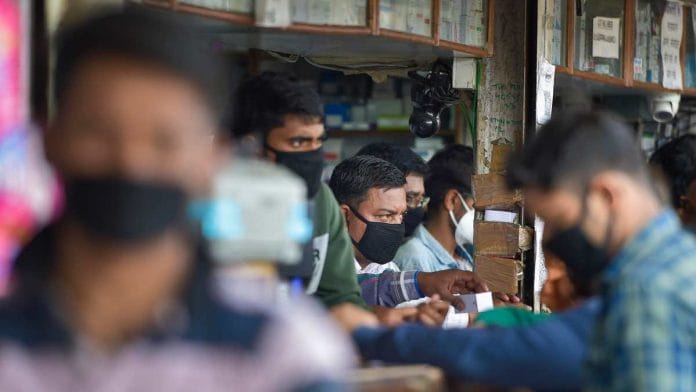New Delhi: Months after the world first learnt about the novel coronavirus, scientists continue to find new insights into the Covid-19 illness. These developments could help develop vaccines and drugs against the SARS-CoV-2 virus strain.
Here are some of the latest research developments in the fight against the global pandemic.
Covid-19 associated with ‘unique’ blood clotting in lungs
Scientists have found abnormal blood clotting in patients with severe Covid-19 infection, one that causes micro-clots within the lungs.
The study by researchers at Royal College of Surgeons in Ireland explains what leads to death in some patients.
Published in the British Journal of Haematology, the study found that patients with higher levels of blood clotting activity had a significantly worse prognosis and were more likely to require ICU admission.
The findings demonstrate that Covid-19 is associated with a unique type of blood clotting disorder that is primarily located within the lungs and contributes to high levels of mortality in patients.
Also read: Antibody from llamas could help block coronavirus entry into cells, say researchers
US launches trial to test efficacy of BP drug
Scientists at the University of California San Diego have launched a clinical trial to test whether Ramipril — a drug used for treating high blood pressure, heart failure and diabetic kidney disease — might also reduce the severity of Covid-19 infections.
The trial will test whether this drug can lower rates for intensive care unit admissions, the use of mechanical ventilators and deaths.
The study will recruit up to 560 participants with Covid-19 and the trial is expected to run for one year.
Drugs like Ramipril are first-line therapies for managing patients with hypertension and reducing the risk of myocardial infarction, heart failure, stroke and death from cardiovascular causes.
3D-printed low cost ventilator can work without electricity
Scientists have designed a new ventilator that requires no electricity and can be 3D- printed at low cost.
Depending on the printer used, a single ventilator could be manufactured within three to eight hours and made operational with the addition of low-cost springs available at hardware stores, the researchers have said.
These low-tech ventilators can be replicated anywhere in the world with material worth less than $10.
The scientists have found that the ventilator can be operated for seven continuous days with zero issues.
If the ventilator design is approved, researchers believe that not only would it help hospitals in the ongoing pandemic, but the device could also be used in remote regions or after a natural disaster when electricity is scarce.
Anti-cancer drug Selinexor to be tested in Covid-19 patients
A team from Australia-based Novotech and US-based Karyopharm Therapeutics have launched a study to evaluate the safety of two regimens of low dose oral selinexor in patients with moderate or severe Covid-19 infection.
Selinexor in combination with dexamethasone was approved by the US FDA in July last year for the treatment of adult patients with relapsed or refractory multiple myeloma — a type of blood cancer.
This is the second study on selinexor for Covid-19 that is being initiated by Karyopharm and is expected to enroll 80 patients. Novotech will manage the Asia-Pacific region for the study, which will include several sites in Australia and Malaysia.
Also read: CSIR to test sepsis drug in asymptomatic Covid patients and those who have recovered






